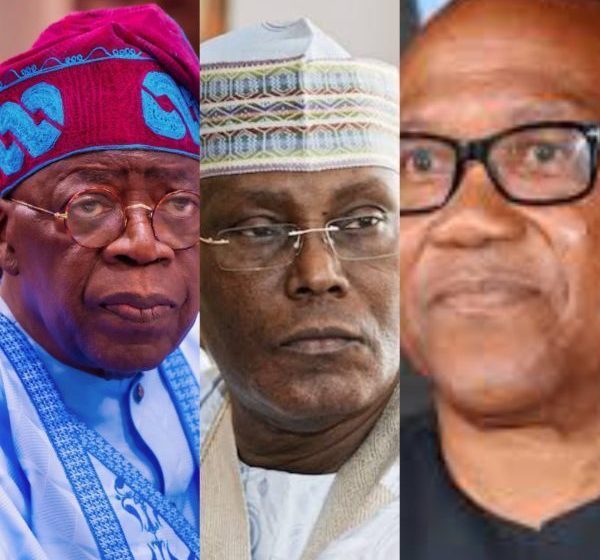Why ADC’s coalition against APC and Tinubu may crumble before 2027

ADC’s 2027 Coalition: Bold Move or Broken Alliance in the Making?
The emergence of the African Democratic Congress (ADC) as the rallying point for a grand coalition of opposition figures has ignited fresh hope among Nigerians longing for a strong alternative to the All Progressives Congress (APC) and President Bola Tinubu’s government.
Backed by political heavyweights like Atiku Abubakar, Peter Obi, Rauf Aregbesola, Nasir el-Rufai, and Rotimi Amaechi, the coalition appears formidable on paper. But beneath this impressive lineup lies a familiar weakness: deeply conflicting ambitions and a history of fragile unity.
If history is any guide, the ADC coalition’s biggest threat isn’t the APC—it’s itself.
Clashing Presidential Ambitions: Atiku vs Obi
At the heart of the coalition’s potential downfall is the unresolved 2023 tension between Atiku Abubakar and Peter Obi. Both men contested the presidency—Atiku under the People’s Democratic Party (PDP), and Obi under the Labour Party (LP)—splitting the opposition vote and inadvertently paving the way for Tinubu’s victory. Multiple efforts by prominent figures and civil society groups to get them to unite behind a single candidate failed due to ego, ambition, and mutual distrust.
Now in 2025, both men are once again positioning themselves for the 2027 presidential race. Atiku, who turns 79 in 2026, may see this as his final shot at the presidency. Obi, on the other hand, believes he captured the youth vote in 2023 and has unfinished business. Neither man has shown any indication of backing down. Bringing them into the same coalition, under the ADC umbrella or otherwise, may look good in press releases—but political history suggests they won’t willingly concede to one another.
A History of Broken Opposition Alliances
Nigeria’s political history is littered with the graves of failed opposition coalitions. In 2011, the Congress for Progressive Change (CPC), Action Congress of Nigeria (ACN), and others attempted to form a grand alliance against President Goodluck Jonathan. Talks collapsed due to disagreements over who would fly the presidential flag.
The most successful merger in Nigeria’s democratic history remains the formation of the APC in 2013. But that success was rooted in early compromise and clear power-sharing arrangements among opposition leaders, particularly between Muhammadu Buhari and Bola Tinubu. It worked because they prioritized the mission of dethroning the PDP, and the ambitions of key players were temporarily suppressed.
In contrast, ADC’s current coalition has no clear pathway for consensus. It is composed of former rivals, defectors, and ex-ministers from competing ideologies and interests. Without a structured process for selecting a consensus candidate and handling dissent, the coalition risks collapsing under the weight of its contradictions.
A Coalition of Strange Bedfellows
The coalition’s diversity, while potentially a strength, also presents structural weaknesses. Atiku is associated with the old PDP guard; Obi appeals to younger, reform-minded voters; Aregbesola is still seen by many as a Tinubu loyalist turned critic; El-Rufai and Amaechi have long-standing personal and ideological rifts with each other and with other coalition members.
What binds these leaders at the moment is not necessarily shared vision or ideology—it’s opposition to Tinubu. But political coalitions driven purely by opposition tend to fall apart once conversations shift from protests to power-sharing.
As 2027 approaches, who gets what—especially the presidential ticket—will dominate the discourse. Without clear succession planning or a binding internal agreement, personal ambitions will likely tear the house apart.
READ ALSO
David Mark, Obi, Atiku, El-Rufai — meet members of ADC’s new coalition against Tinubu
Who is David Mark? ADC’s interim chairman leading coalition against Tinubu
Why Nigerians should reject ADC coalition, support Tinubu for second term – Omokri
Opposition coalition adopts ADC for 2027 elections….what you need to know
The ADC Brand Dilemma
While ADC has provided a legal and symbolic platform for the coalition, it is still widely seen as a fringe party with minimal electoral footprint. It lacks the national structure and financial war chest of the PDP or APC. This creates another potential area of dispute: who controls the party’s machinery?
If Atiku, Obi, or any other contender tries to dominate ADC’s decision-making, existing party stakeholders and incoming coalition players may rebel. The danger here is that ADC may become a battleground rather than a bridge—and history shows that once cracks form in a coalition, the APC is very skilled at exploiting them.
Public Distrust of Elite Coalitions
Another underappreciated challenge is public perception. Nigerians are increasingly skeptical of elite political coalitions that seem to form only to contest elections, without offering tangible ideology, solutions, or accountability. The youth-driven energy that fueled Obi’s 2023 rise came largely from a rejection of recycled politicians. This same demographic might not be enthusiastic about a coalition featuring figures they perceive as part of the old political order.
If the ADC coalition fails to genuinely reflect the aspirations of Nigerians—especially the youth and working class—it may struggle to galvanize nationwide support, regardless of the names on its roster.
A Coalition on Shaky Ground
The idea of a unified opposition under ADC is a compelling one, and the presence of experienced political actors gives it potential weight. But unless the coalition addresses its internal contradictions, resolves questions of leadership and candidacy, and builds a shared vision beyond defeating Tinubu, it may implode long before ballots are cast in 2027.
History shows us that personal ambition has derailed even the most promising alliances in Nigeria. Unless Atiku, Obi, and others learn from 2023 and move beyond ego for collective interest, the ADC coalition may become just another failed footnote in Nigeria’s evolving democracy.

